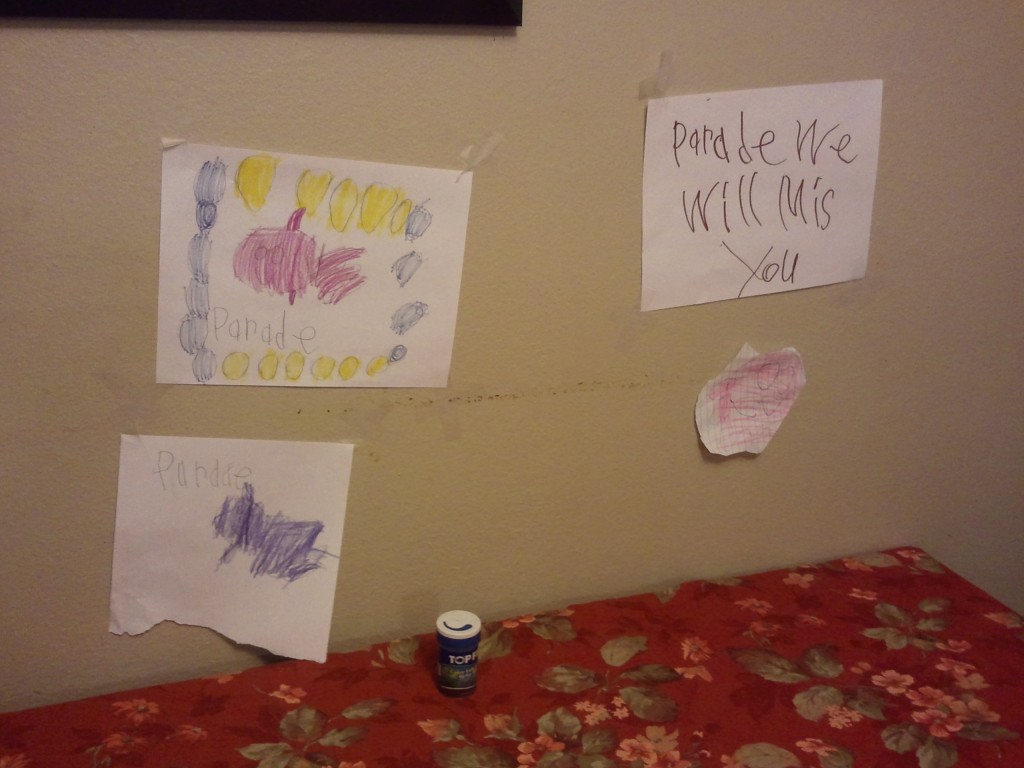A couple of years ago I wrote a post entitled “The Gift Our Fish Gave Us” as a reflection on how navigating the death of their fish after two years was developmental and formational for our kids. Well, we got another fish….and it died this week. It too gave us the gift of grieving. But it was quite the day with my 5 year old son Colin – the subject of many of these “pre-school theology” posts.

It all started with a little fumigation. Daddy thought he had safely contained the fish to avoid the gas chamber experience. But Daddy was wrong. Dorothy the fish was belly up and good ole Dad was public enemy #1 for awhile.
It was amazing that during the course of a whole day I watched my son go through like all 5 stages of the grief process.
First – he was angry with me. He blamed me. Direct quote, “You did it on purpose!” He attributed evil intentions to the mistake that caused him to experience loss. He even came close to trying to hit me, but he held back at the last minute. But the pain of his loss was funneled toward anger and blaming.
Second – I took him on some errands to reconnect and work through the tension. At one point he began to try to convince me that Dorothy really was in fact not dead, but sleeping. She was just really tired from holding her breath during all the gas. He had a strong rationalization for how his loss was all a mistake. Denial at work.
Third – After realizing that the fish was dead and his rationalization broke down and wasn’t doing the job, he looked for other ways to deal with his loss. He came up to me and said, “Dad, I have an idea! We can pretend to be happy!” I see this as a combo of rationalization, denial, and bargaining. I couldn’t believe he said it. “We don’t have to feel sad if we just pretend we’re happy!” (Lot of people living their lives with this philosophy! Amazing how early that thought can set in)
My son’s creative solution “to pretend” is a diabolical lie and there’s not much greater of a disservice I can do as a parent than reinforce such a lie that “pretending” is a valid life approach to facing loss and pain. It’s our job as parents to help our kids embrace a vision of life that is so much bigger and so much deeper and powerful than….pretending. But it’s so tempting to pretend!
Fourth – We had our funeral as a family. Everyone had done artwork as in the case of Fish #1. Everyone shared what they drew (Including 2 year old Kaelyn who was experiencing grieving for the first time in this way). Then they shared what they appreciated about the fish. It is so amazing to hear what little kids share about what was meaningful to them – even as it relates to a fish. But the funeral had much sadness, much crying, even some wailing. We prayed and then flushed Dorothy to Great Beyond. My favorite memory was Kaelyn blowing kisses into the fishbowl as Dorothy was circling, saying, “Bye Bye Dorothy!”
Fifth – We did reach a point of acceptance. Dad got forgiven. Order was restored. Yet sadness still lingered as kids shared throughout the week random feelings of sadness. Even Kaelyn would randomly just walk around saying every once in a while, “Sad…Dorothy…Jesus.”
These moments are always wild, but so thankful for the fruit produced when we go through it together and don’t settle for the alternatives to grieving: denial, pretending, blaming.
This weekend we had some of our kids cousins’ in from out of town and they all had a great weekend together. They left for the airport this afternoon and said goodbye. Afterward Kaelyn was eating dinner and she shared on her own, “Mama I sad.” We both shared back, “Us too Kaelyn, we’re sad too.” Later after we began packing up pictures and wall decorations for our move she also said, “Mama I sad. Pictures Gone.”
I love that my two year old sees sadness as normal, as something that can be articulated and shared. My kids still fight loss just like the rest of us, but we’re glad they are learning to talk about it!
There’s no shortage of human dysfunction that flows from the unwillingness or inability to grieve loss and pain and limitation. I speak from experience. I fight it in all the ways my son tried to fight feeling the loss of his fish. I look for ways around it.
We’re all in process. But I find myself resonating and even using the very words of my toddler in moments where I’m feeling very non-toddler types of loss…..”I sad.”
It’s amazing how simple a phrase can trigger such a sense of freedom, honesty, and intimacy in relationship. Reminds me of a similar phrase in Scripture, “Jesus wept.” Such simple language that penetrates all of the complexities surrounding those moments when we’re most aware that we’re fallen people living in a fallen world.
